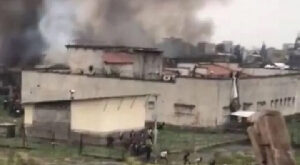Fabrice Iradukunda was just a baby when his father, a pharmacist, was killed in the 1994 Rwandan genocide against the Tutsi. His mother also passed a few years later, and as an orphan, he was left in the hands of a family that was friends with his parents, and has been his guardians since.
Life of course came with struggles, but in the hands of his new family, Iradukunda was able to live and pursue his dreams.
28 years on, he is on the verge of becoming a doctor. His goal is to step in his father’s shoes and see that his dream lives on through him.
The New Times had an interview with the aspiring medic, where he shared his survival story and goal to live his father’s dream.
Before the Genocide, my father was a pharmacist by profession. He used to run a pharmacy (MEDIPHAR) in Butare town. It was located at what was called Bihira stage by then.
We lived a normal life just like any other family, my father, mother and I. By then I was just a baby and the only child that my parents had. We had friendly neighbours and life was good.
Before the 1994 Genocide against the Tutsi, my parents were living together. But they separated during the Genocide, as they struggled to find places to hide.
My dad was killed on April 21, together with his brother Wellars during the Tumba massacres. By that time, my mom and I were hiding at the University of Rwanda (which was then referred to as the National University of Rwanda) in Butare town.
My mother died two years after (in 1996) succumbing to a disease. I was adopted by my father’s friends, a family of Christophe Habiyambere and Josee Gasengayire. They were very close friends to my dad because they went to the same secondary school and university – UNR.
They raised me up to now, and I am thankful that they lived to fill my parents’ gap.
Since Habiyambere and Gasengayire, who adopted me, were very close friends to my dad, they inspired me. They always told me stories about my dad time and again. How he used to work in a pharmacy and was well known because of that, how he loved people a lot, and how charming he was.
From that time, I developed a spirit of living like how my father would have lived. I wanted to be like him.
When I joined university, I took General medicine as my course. I was so encouraged by my new family, for they would see my late dad through me.
Stepping in my father’s shoes is very important to me and to my father who passed away 28 years ago. I feel like I live to fill his gap, especially in the medical field. He did what he did with compassion. I am stepping in very important shoes.
My message to all the survivors of the Genocide around the world is: If there wasn’t a bit of rain, there would have never been a rainbow. Don’t stay down in loneliness, because we have a good country and we have been given a platform. Let’s use all that for ‘never again.’
And to the post-genocide generation, don’t take for granted the blessing of a peaceful government, good leaders and a better nation. Exploit all the opportunities that come around and contribute to building a better Rwanda.
Source: newtimes.co.rw
 Home Of Ghana News Ghana News, Entertainment And More
Home Of Ghana News Ghana News, Entertainment And More





